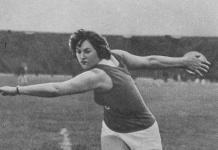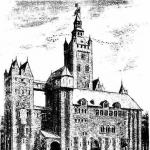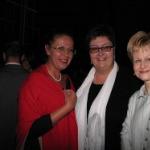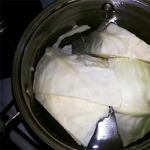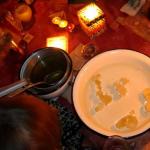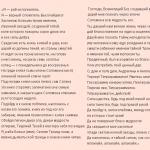ON THE. Panin - Kolomenki
Nikolai Aleksandrovich Kolomenki was born in January 1872 in the village of Khrenovoe, Bobrovsky district, into the family of the director of the Voronezh Agricultural Machinery Plant. Since childhood, he has been fond of sports, especially ice skating. In 1882, the family moved to St. Petersburg, where he studied at the gymnasium and then at the university in the department of natural sciences. At the university, he is also interested in sports, especially cycling, and tries himself as a coach. His students Mikhail Dyakov, Sergei Krupsky, Dmitry Marshalov were considered the best cyclists in the North of Russia. When an accident happened to Sergei Krupsky (he crashed on a cycling track and never competed again), Krupsky, who went by the pseudonym “Panin,” asked Kolomenkin to take his pseudonym. This is how Panin - Kolomenki appeared. Since 1896 N.A. Panin begins to systematically practice figure skating. Two years later he is no longer inferior to anyone. In 1902 he confirmed the title of the strongest figure skater in Russia. In 1904 he went to Switzerland, where the European Figure Skating Championships were held and took third place. At the IV Olympic Games in October 1908, he won a gold medal and a diploma as the winner of the Olympic Games. He became the first Russian Olympic champion. Before this, Nikolai Alexandrovich was already a silver medalist at the 1903 World Championships, the 1908 European Championships, a bronze medalist at the 1904 European Championships, and a five-time champion of Russia in figure skating.
ON THE. Panin-Kolomenki was a versatile athlete who also achieved success in pistol shooting. He won the championship in this sport twenty-three times. Panin - Kolomenki continued his coaching work. In 1908, he recruited young skaters and was involved in judging competitions.
His coaching work did not stop after the revolution. In 1920, the first figure skating competitions under Soviet rule were held in Petrograd. He was their judge. His book “Figure Skating,” published in 1910, became the first manual for athletes. In 1938, he published the book “The Art of Skating.” A year later, the academic council of the Institute of Physical Education awarded N.A. Panin's degree in Candidate of Pedagogical Sciences. In 1940, they began to operate in Leningrad under the leadership of N.A. Panina All-Union courses for figure skating instructors, which trained many excellent coaches and athletes. The Leningrad figure skating school remains the best to this day. At its crucible stood the famous figure skater and outstanding theoretician of this sport, Nikolai Aleksandrovich Panin.
V.L. Patkin
Vladimir Leonidovich Patkin was born in 1946 in the city of Bobrov. Studied at Bobrovskaya school No. 1. From the 7th grade I played volleyball at a children's sports school. On the volleyball court, he stood out for his composure: the attacking blow was more accurate, he placed the block more reliably, and found an unprotected place on the opponent’s court. In 1963, he played for the regional school team. Patkin becomes the team's main player. His skill grew. Patkin is invited to the team of masters of the Voronezh Dynamo. Here, under the guidance of the Honored Coach of the RSFSR A. Rogozin, Vladimir grew into an excellent player. The Voronezh team has won victories more than once. He became a master of sports of the USSR. At the end of the 60s. Vladimir is invited to play for the CSKA team. Since 1970 he has been a striker in the team. Soon the players elected him captain, and Vladimir confidently led the team to victory. CSKA wins one victory after another in the national championship. Since 1971, the championship of Europe and the USSR has not been inferior to anyone. In 1972 he became a bronze medalist at the Olympic Games. Since 1975, Vladimir Leonidovich has been the second coach of the USSR men's team and again successfully leads the team to victory. Win gold at the European Championships 1975, 1977, 1979, 1981; World Championships 1978, 1982; silver medalists of the XXI Olympiad and the Olympic championships of the XXII Games in Moscow. For the great contribution made to the development with V.L. Patin was awarded the Order of the Badge of Honor and the Medal for Labor Distinction.
A.M. Evdokimov
Alexander Mikhailovich Evdokimov was born in 1947 in the city of Mary, Turkmen SSR. Soon the family moved to the village of Khrenovoe, where he spent his childhood. The love for horses was passed on to him by inheritance. They say that his grandfather roamed with a camp, and his grandson inherited from his ancestor jet-black eyes, curly hair and, of course, a love of horses. From the age of 12, Alexander began training in the equestrian section at the Khrenovsky stud farm, and enthusiastically mastered the difficult art of horse riding. Having graduated from high school with a gold medal, he devotes himself entirely to sports. As a member of the equestrian team of the VSO "Urozhay" he takes an active part in many all-Union and international competitions and more than once emerges as a winner. At the age of 16 he was awarded the title of master of sports. In 1964, at the national equestrian championship in the most difficult form of triathlon, Alexander won a gold medal. At the USSR championship in 1968, riding the Traken stallion Fato, he won the triathlon for the second time and received a second gold medal. A. Evdokimov also participated in international competitions. For the first time in 1966, in Czechoslovakia and in the city of Pardubice, as part of the USSR national team, he won the European Championship. At the European Championships in 1973, held in Kyiv, he competes on the horse Eger of the Khrenovsky stud farm. He competes for the title of champion together with the English Princess Anne and emerges victorious, receiving a small gold medal and a champion cup, which is kept in the Khrenovsky Stud Museum. Alexander Mikhailovich was a participant in two Olympic Games and a five-time national champion in triathlon. Graduated from the Moscow Institute of Physical Education and Sports. He worked as a coach for many years. Alexander Mikhailovich is considered the best equestrian eventer, an international master of sports.
In the last century there was a great army of Soviet athletes. These people fought courageously for victories, bringing joy to their fans, raising the prestige of the country, and developing Soviet sports. All of them were idols of youth of that time. Remembering famous athletes, one cannot help but mention the main events in sports life of the Soviet period.
The main achievements of the athletes were, of course, the Olympic Games. The Soviet Union took part in the Olympic Games for the first time in 1952, at the Helsinki Olympics. In those games, the Soviet country won 22 gold medals, 30 silver and 19 bronze.
The first Olympic medalist – Nina Apollonovna Ponomareva-Romashkova
The first gold medal of the USSR was won by Nina Apollonovna Ponomareva - Romashkova. The athlete began her sports career in running disciplines, and later became interested in discus throwing. Immediately after the games in Helsinki, the gold medalist set a world record in discus throwing - the throw range was then 53 meters 61 centimeters. Later in Nina’s sports career there were many victories, including new records. Since 1966, Nina Apollonovna switched to coaching, preparing growing athletes for new victories. 
On the ice arena. Irina Rodnina
Hockey team players and figure skating representatives brought many victories to the Soviet Union. At world competitions, Soviet athletes had no equal on the ice in terms of strength and skill. Irina Rodnina has become famous among figure skating masters since 1963, performing at all-Union youth competitions. From 1964 to 1969, life on the ice was not easy for Irina. Under the guidance of coach S.A. Zhuk, who complicated the program many times, with his partner Alexei Ulanov, Irina went to the European Championship. The couple took first place in free skating, and Irina received the title of Honored Master of Sports of the USSR.
For her victory at the Olympics in 1972, Rodnina was awarded the Order of the Red Banner of Labor. On the eve of the performance, the athlete suffered a traumatic brain injury during training, but she did not give up the performance and overcame her painful condition. Since the fall of 1972, Irina began performing in tandem with Alexander Zaitsev. Figure skating fans will remember this duo for a long time. 
Golden goalkeeper – Vladislav Tretyak
There is hardly a more famous figure in hockey than Vladislav Tretyak.
The first goalkeeper of our country, many times recognized as the best at the world championships, recognized as the best hockey player of the last century. The legendary Soviet athlete, the first European to be inducted into the Hockey Hall of Fame in Toronto in 1997. Three-time Olympic champion who won gold; 10-time world champion; 9-time European champion; A 13-time champion of the USSR, whose books were published in different languages, were printed four times and were instantly sold out in America. Since 2006 - President of the Russian Hockey Federation. 
Storm of the Gate - Valery Kharlamov
Another legendary athlete is CSKA scorer Valery Kharlamov, whose life was tragically cut short. A man who once beat his fate. Two-time Olympic champion in 1972 and 1976. An 8-time world champion, Valery began playing sports as a small, sickly boy. It was impossible to give his age to him in appearance - he was so short. But what would Soviet hockey be without him? He received many honors justly, because he has 438 matches for CSKA and 293 goals in his matches. At the World Cup and Olympics - 123 matches, 89 goals.
The best scorer in the history of the World Hockey Championships - won 155 points in 105 matches. Fate did not spare him, but he did not give up. Once he got into a car accident, trained for a long time and finally went on the ice again. Later, as a result of a fatal mistake, he also dies in a car accident. Two children remain, a girl and a boy. And then the hockey club came to the rescue. The fates of the hockey players were closely intertwined; they were all family. Teammates looked after their little son Alexander, who also became a hockey player. It’s not surprising, because one of his mentors was Fetisov. 
Vyacheslav Fetisov is an Honored Master of Sports of the USSR and an Honored Trainer of Russia. Defender of CSKA, and later of the Spartak club, who played 480 matches at the USSR and Russian championships and scored 153 goals. Winner of all top hockey titles. The areas of his activity today are anti-doping programs for athletes at different levels. 
On a black and white field: about Karpov and Kasparov
There is hardly a person unfamiliar with the names Karpov and Kasparov. Ice and fire, struggle and hope. Lots of tournaments. The rating of the match between Anatoly Karpov and Garry Kasparov in 1984-85 does not decrease even today. Modern chess players learn to play from these matches, and old, experienced chess players are still trying to figure it out, look into that time from here, and understand what was most important in that period: integrity, determination, calculation and scientific skill. Anatoly Karpov is 64 years old this year, and Garry Kasparov is 52, he is a lecturer and entrepreneur. 
Record holder Alexander Dityatin
Alexander Nikolaevich Dityatin is not just a three-time Olympic champion and 7 times world champion, he also distinguished himself by the fact that at the 1980 Olympics, held in Moscow, he earned 8 medals in all evaluated gymnastic exercises. It was with this record that he entered the Guinness Book of Records. 
In the air as on the ground: Sergey Bubka
The famous Soviet and Ukrainian track and field athlete Sergei Nazarovich Bubka is familiar to many for his unforgettable pole vaulting. He is an Honored Master of Sports of the USSR and a champion of the 1986 Olympic Games, a 6-time world champion, who set his own world record in pole vaulting at 6.15. This record was broken only in February 2014. Strength, speed and technique are the main components that Sergei Bubka was taught to master by his personal trainer Vitaly Afanasyevich Petrov. 
Boxer Kostya Tszyu is an Honored Master of Sports of the USSR, he became the USSR champion three times, was a two-time European champion and once a world amateur champion. Konstantin Tszyu develops his own methods of training professional boxers and successfully trains famous athletes today. 
One of the greatest Greco-Roman wrestlers. This athlete managed to compete not only for the USSR national team, but also for Russia. He won the Olympic Games once as part of the USSR national team and two more times as part of Russia. He also has 9 victories at the World Championships and 12 European Championships. Recognized as the best athlete of the year in the world, included in the list of the 25 greatest athletes of the 20th century. He won 888 fights and lost only 2 times. There were even cases when opponents were simply afraid and refused to go against him.

In the sports of Soviet times, there were no losers and the victories of athletes from the USSR were incomparable with the victories of many foreign representatives. Russian sport these days continues to delight its fans with its bright victories.
Modern Olympic Games medalists since 1896, sorted by sport. Contents 1 Summer sports 2 Winter sports ... Wikipedia
Below is the medal table for the Summer and Winter Olympics from 1896 to 2008, excluding the 1906 Summer Olympics, which were not recognized by the IOC. Contents 1 Medal table 2 IOCs without medals 3 ... Wikipedia
Canadian equestrian Ian Millar holds the record for most Olympic appearances. This is a list of athletes with the most Olympic appearances. This includes men and women, participants in winter and... Wikipedia
A service list of articles created to coordinate work on the development of the topic. This warning does not apply to informational articles, lists and glossaries... Wikipedia
Sports awards Swimming Olympic Games Gold Seoul 1988 200 m backstroke Gold Barcelona 1992 100 m backstroke ... Wikipedia
Mark Spitz Spitz in July 2008 Personal and ... Wikipedia
This term has other meanings, see Oriola (meanings). Christian D'Oriola Personal information Original name: Christian D Oriola Nickname(s): d'Artagnan Nationality ... Wikipedia
Forbes has chosen the most successful and titled Russian Olympians from whom fans can expect gold medals.
15 days before the start of the Games in Sochi, the Russian Olympic Committee approved the composition of the national team: 223 athletes received tickets. After the failure at the Games in Vancouver, the athletes are faced with an ambitious task - to fight for getting into the top three in the unofficial team event at the home Olympics.
Viktor An
Age: 28 years old
The most titled athlete in the history of world short track speed skating has a rather unusual name for a Russian - Ahn Hyun Soo. Until December 2011, the short speed skater represented South Korea, but then received a Russian passport and became not only Victor, but also the only three-time champion of the Winter Olympic Games in Russia who continues his career.
Ahn Hyun-soo made the decision to compete for Russia after he failed to qualify for the South Korean team for the Olympics in Vancouver. This was the result of a serious injury and surgery, after which the former world record holder could not stand the competition in his home country at distances of 1000, 1500 and 3000 meters. The athlete, who is a five-time absolute world champion and two-time World Cup winner, has already won the Russian Championship twice and qualified for the home Olympics in Sochi.
Olga Zaitseva
Age: 35 years
The coaches place their main expectations in biathlon on the women's relay, where Olga Zaitseva will compete. The leader of Russian biathletes twice became an Olympic champion in the relay race - Turin 2006 and Vancouver 2010. She also has silver, won in the mass start at the disastrous Canadian Olympics. Despite the failures of Russian biathlon in recent years, Zaitseva can count on success in Sochi. She has been among the elite of world biathlon for many years and still playfully deals with all her teammates - both on the shooting range and on the ski track.
Evgeni Plushenko
Age: 31 years old
Turin Olympic champion Evgeni Plushenko returned to big sport for the Games in Sochi, where he is competing for gold medals. A year ago, the ten-time Russian champion suffered a severe spinal injury, a complex operation during which titanium plates were inserted into his back. Therefore, the athlete abandoned the singles program in Sochi in favor of the team championship.
At the Olympics, Russia has only one place in single figure skating; here, instead of Plushenko, 18-year-old Maxim Kovtun, who won against his legendary counterpart at the Russian Championship, will compete.
After performing on the team, Plushenko will be able to complete the Games, but regardless of the result, they will become special for the athlete - he will go down in history as the only figure skater to compete at four Olympics. Evgeniy won silver twice - in Salt Lake City 2002 and Vancouver 2010, and also became a champion in Turin 2006. Plushenko is a three-time world champion, a seven-time European champion, and the first figure skater in the world who managed to win four times in the finals of the world Grand Prix series.
Nikita Kryukov
Age: 28 years old
Senior police lieutenant, skier Nikita Kryukov performs most successfully in sprint races in the classical style. Since the Vancouver Olympics, the Russian has managed to eclipse the main star of ski racing - the Norwegian Peter Northug, whom experts predicted many years of hegemony. For the first time, Kryukov overtook Northug in Vancouver, which became almost the main sensation in skiing. The current Olympic champion and two-time world championship winner Kryukov is approaching the home Games as the main favorite.
Alexander Zubkov
Age: 39 years old
For the Sochi Olympics, bobsledder Alexander Zubkov voluntarily left the post of Minister of Physical Culture, Sports and Youth Policy of the Irkutsk Region. “Russia needs me” is how he described his unexpected return to sports.
Zubkov is a legend of Russian bobsleigh. He managed to create a team that managed to take silver and bronze medals at the Olympics. In 2011, the crew led by Zubkov managed to win gold at the World Championship for the first time in Russian history. The bobsledder has seven victories at the World Cup stages. At the last world championship, the Russian four won silver, losing to the Germans, but ahead of the reigning Olympic champions from the USA.
Ivan Skobrev
Age: 30 years
At the last Games in Vancouver, Khabarovsk native Ivan Skobrev won silver and bronze - this is the first time since 1986 that a domestic speed skater climbed onto the Olympic podium. The discipline in which the USSR national team traditionally took most of the medals has already begun to be called “not ours.” But then Skobrev appeared, and the Russians on the ice began to be afraid again. At the closing ceremony of the 2010 Games, the athlete carried the Russian flag.
Albert Demchenko
Age: 42 years
For luger Albert Demchenko, the Sochi Olympics will be the seventh in his career. The fate of the Perm athlete was not simple. In the mid-90s, due to problems with financing luge sports, he was forced to sell meat at the market to feed his family. However, then Demchenko returned to the sport, where he was destined for a new test. Just 0.03 seconds separated the vice-champion of Turin 2006 from medals at the Games in Vancouver. In Sochi, Demchenko will try to take revenge on the Germans Felix Loch and Armin Zoggeler, whom he beat several times last season.
At the Sanki bobsleigh track in Krasnaya Polyana, the three-time European champion and World Cup winner, in addition to the singles, plans to compete in the relay.
Tatiana Volosozhar and Maxim Trankov
Age: 27 / 30 years
At the Olympics in Vancouver, Russia for the first time in history was sensationally left without gold medals in figure skating. But on the eve of Sochi 2014 at the European Championships in Budapest in pair skating, the Russians occupied the entire podium. The main star of the national school of figure skaters in the last four years has been the duet of Tatyana Volosozhar and Maxim Trankov, who confidently knocked the Germans Alena Savchenko and Robin Szolkova off the Olympus.
In addition to their third career victory at the European Championships, Volosozhar and Trankov approached the home Olympics in the rank of current world champions, last year bringing Russia its first championship gold in pair skating since 2005.
Ilya Kovalchuk
Age: 30 years
The main medal of the Olympic Games in Sochi will be played on ice. One of the main contenders for gold is the Russian national hockey team. It includes four world-class superstars: Alexander Ovechkin, Evgeni Malkin, Pavel Datsyuk and Ilya Kovalchuk, who returned to Russia on the eve of the Olympics after 11 years in the NHL.
Kovalchuk, unlike his teammates, won World Championship gold twice. In 2008, in Quebec, the team defeated Canada thanks to his goal in the final overtime. A year later, in Bern, Switzerland, the Russian team with his participation again defeated the Canadians in the final. Before this, hockey players had not won the world championship for 15 years. The hockey team has never won at the Olympics - the last gold medals were won in 1992 in Albertville, a few weeks after the collapse of the USSR, by the so-called United Team.
Ekaterina Tudegesheva
Age: 26 years old
Ekaterina Tudegesheva quickly burst into the previously alien world of snowboarding for Russian sports. Over the course of several pre-Olympic seasons, the Russian woman managed to become the owner of the Large and Small Crystal Globes, taking first place ahead of schedule in the final overall World Cup standings. Tudegesheva added her titles to her victory at the World Championships in Stoneham in 2013.
Here are the absolute champions in artistic gymnastics over the past 30 years.
Alexander Dityatin
Alexander Nikolaevich was born in Leningrad on August 7, 1957. He is a three-time Olympic champion, seven-time world champion, one of the best gymnasts of all time. Honored Master of Sports of the USSR.
Seven-time world champion in 1979 and 1981. Two-time European champion in 1979. Multiple champion of the Spartakiads of the peoples of the USSR. The only gymnast in the world who has medals in all evaluated exercises at one Games: at the Moscow Olympics in 1980 he won 3 gold, 4 silver and 1 bronze medals. With this result, he entered the Guinness Book of Records. He played for Dynamo Leningrad.
But three years later, shortly after the Moscow Olympics, he received a ridiculous but serious injury - a dislocated ankle. Alexander continued to perform for some time and even won awards at major international competitions. In November 1981, Dityatin entered (already as captain) onto the platform of the next World Championship, which took place in Moscow, at the Olimpiysky sports complex. Alexander said: “I will do everything for the team to win.” And did. The Soviet team again became the best in the world, and Dityatin himself won 2 more gold medals - in exercises on the rings and on the uneven bars. After finishing his career as an athlete, he became a coach, working until 1995.
Koji Gushiken

Japanese gymnast, Olympic champion and world champion, born November 12, 1956 in Osaka, graduated from the Japan University of Physical Education. In 1979 he won silver and bronze medals at the World Championships. In 1980, due to a boycott organized by Western countries, he was unable to take part in the Olympic Games in Moscow, but in 1981, at the World Championships held in Moscow, he won gold, silver and two bronze medals.
At the 1983 World Championships he won gold, silver and bronze medals. In 1984, at the Olympic Games in Los Angeles, he won two gold, silver and two bronze medals. In 1985 he won a bronze medal at the World Championships; that same year he announced his retirement from sports.
Vladimir Artyomov

Vladimir Nikolaevich was born in Vladimir on December 7, 1964. He is a four-time Olympic champion and one of the best gymnasts of all time. Honored Master of Sports of the USSR. He graduated from the Vladimir State Pedagogical Institute, where he later taught. He spoke for the local VDFSO trade union “Burevestnik”.
World champion in the team championship (1985, 1987 and 1989), in the uneven bars (1983, 1987 and 1989), silver medalist in the all-around (1985), in the team championship (1983), in floor exercise (1987 and 1989), in exercises on the horizontal bar (1989). Absolute champion of the USSR (1984). In 1990 he left for the USA, where he currently lives in Pennsylvania.
Vitaly Shcherbo

Vitaly was born in Minsk on January 13, 1972. He is a six-time Olympic champion in 1992 (the only non-swimmer in history to win 6 gold medals at one Games), one of the best gymnasts of all time (the only man to become world champion in all 8 disciplines - individual and team championships, as well as in all 6 shells). Honored Master of Sports of the USSR, Honored Master of Sports of the Republic of Belarus.
Scherbo ended his sports career in 1997 after breaking his arm due to a fall from a motorcycle. Currently, Vitaly lives in Las Vegas, where he opened his gym “Vitaly Scherbo School of Gymnastics”
Li Xiaoshuang

His name literally means “the younger of the pair” - he is the younger twin brother of another Chinese gymnast, Li Dashuang. The brothers were born on November 1, 1973 in Xiantao, Hubei Province.
From the age of 6 he began to engage in gymnastics, in 1983 he joined the provincial team, in 1985 - in the national team, then due to an injury he returned to the provincial team, in 1988 he again joined the national team, then returned to the provincial team again, and in 1989 he became a member of the national team for the third time.
At the 1992 Olympic Games in Barcelona, he won a gold medal in the floor exercise and a bronze medal in the rings exercise (as well as a silver medal as part of the team). In 1994, at the Asian Games, he won gold medals in the floor exercise and all-around, silver in the rings exercise, bronze in the pommel horse and uneven bars (as well as gold as part of the team); In addition, in 1994, Li Xiaoshuang won a gold medal at the World Team Championship and a silver medal (in vault) at the individual World Championship. In 1995, he won a gold medal at the World Championships in the all-around, and a silver medal in the floor exercise (as well as a gold medal as part of the team). At the 1996 Olympic Games in Atlanta, Li Xiaoshuang won a gold medal in the all-around and a silver medal in the floor exercise (as well as a silver medal as a member of the team). In 1997 he completed his sports career.
Alexey Nemov

Alexey Yurievich Nemov - Russian gymnast, 4-time Olympic champion, reserve colonel of the Russian Armed Forces, editor-in-chief of the Bolshoy Sport magazine, born on May 28, 1976 in Mordovia.
Alexey began gymnastics at the age of five at the specialized children's and youth school of the Olympic reserve of the Volzhsky Automobile Plant in the city of Tolyatti. Studied at school 76.
Alexey Nemov won his first victory in 1989 at the USSR youth championship. After a successful start, he began to achieve outstanding results almost every year. In 1990, Alexey Nemov became the winner in certain types of all-around at the USSR Student Youth Spartakiad. In 1990-1993, he was a repeated participant in international competitions and a winner both in certain types of programs and in the absolute championship.
In 1993, Nemov won the RSFSR Cup in the all-around, and at the international meeting “Stars of the World 94” he became a bronze medalist in the all-around. A year later, Alexey Nemov wins the Russian Championship, becomes a four-time champion of the Goodwill Games in St. Petersburg and receives three gold and one silver medal at the European Championship in Italy.
At the XXVI Olympic Games in Atlanta (USA), Alexey Nemov becomes a two-time Olympic champion, receiving two gold, one silver and three bronze medals. In 1997, he won a gold medal at the World Championships in Switzerland. In 2000, Alexey Nemov won the World and European Championships and became a World Cup winner. At the XXVII Olympic Games in Sydney (Australia), Alexey became the absolute champion, winning six Olympic medals: two gold, one silver and three bronze.
Nemov arrived at the 2004 Olympic Games in Athens as a clear favorite and leader of the Russian team, despite the injury received before the competition, showing high class, confidence in execution and complexity of the programs. However, his performance on the horizontal bar with the most difficult elements (including 6 flights, including a combination of three flights by Tkachev and a flight by Ginger) was overshadowed by a scandal. The judges gave clearly underestimated scores (especially the judge from Malaysia, who gave only 9.6 points), the average was 9.725. After this, the indignant spectators in the hall, standing for 15 minutes, protested against the judges’ decision with incessant screams, roars and whistles and supported the athlete with applause, not allowing the next athlete to go on the platform. Confused, the judges and the technical committee of the FIG changed the scores for the first time in the history of gymnastics, setting the average slightly higher - 9.762, but still depriving Nemov of a medal. The public continued to be indignant and stopped protesting only when Alexey himself came out and asked the audience to calm down. After this incident, some judges were removed from judging, an official apology was made to the athlete, and revolutionary changes were made to the rules (in addition to the technique score, a difficulty score was introduced, which took into account each element separately, as well as connections between individual complex elements).
Here is this scandalous case:
Paul Hamm
Paul Elbert Hamm was born on September 24, 1982 in Waukesha, Wisconsin, USA.
Olympic champion and two-time Olympic medalist. Two-time world champion and three-time world championship medalist.
Hamm became the first US gymnast to win an Olympic gold medal in the all-around competition. However, the American's success at the Games in Athens was overshadowed by a refereeing scandal. The fact is that the gymnast from South Korea, Yang Tae Yun, who was the leader in the Olympic competitions, was unfairly underestimated for his performances on the uneven bars. The referees' error was recognized, but the results of the competition were not revised.
Yang Wei

Yang Wei was born on February 8, 1980 in Xiantao, Hubei Province. Yang is a Chinese gymnast, multiple world champion and Olympic champion.
On August 14, 2008, Yang Wei won gold at the Beijing Olympics with 94.575 points. After finishing his performance, he shouted into the camera lens: “I miss you!” He addressed these words to his fiancee, former gymnast Yang Yun. After the 2008 Olympic Games, Yang Wei ended his sports career, and he wanted to give the gold medal to his fiancee as a gift.
Unfortunately, there is very little information about Yan Wei on the RuNet. If there are any gymnastics experts among the readers, we will be grateful for the addition.

Kohei was born on January 3, 1989 in Kitakyushu, Fukuoka, Japan. He is the 2012 Olympic champion in the absolute championship, a four-time vice-champion of the Olympic Games, and a seven-time world champion.
He is famous for being the first gymnast to win the all-around at all major competitions in one Olympic cycle, including the all-around at the Olympics. He also became famous for performing difficult exercises with incredible precision. His skills were praised by International Gymnast Magazine as "a combination of great complexity, consistency and extreme elegance of execution."
In October 2014, Uchimura, speaking at the World Championships in Nanning, China, again beat his rivals in the men's all-around with a score of 91.965, breaking away from his closest pursuer Max Whitlock by 1.492 points. Kohei sets a new personal record - five-time absolute world champion in men's all-around. Uchimura also wins two silver medals: in the team all-around final, and in a separate gymnastic all-around event - on the horizontal bar.
Read on Zozhnik:





